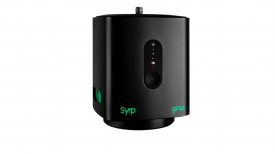Blackmagic Design has released DaVinci Resolve 18.1, a major new update that adds support for editing in vertical resolutions such as TikTok, Snapchat, and Instagram TV, as well as automatic locking of individual timelines within bins for multi-user collaboration.

This update also adds DaVinci Neural Engine-enabled AI dialogue leveler and AI voice isolation tools to the cut, edit, and Fairlight pages as well as vector keyframing for Fairlight automation curve editing. Fairlight grid support has also been added allowing customers to position clips on a grid based on timecode or musical tempo. DaVinci Resolve 18.1 also makes projects imported from ATEM Mini ISO projects easier to edit for customers, with audio now attached to the video clips.
Davinci Resolve is software that just keeps giving. It is amazing how often Blackmagic Design updates the software. Yes, there are the occasional bugs, but that is always going to be the case when there are so many updates.
DaVinci Resolve 18.1 Key Features
- Vertical resolution options in project settings for social media.
- Select custom thumbnails and channels for YouTube uploads.
- Support for individual timeline locks enhancing multi-user collaboration.
- New DaVinci Neural Engine enabled voice isolation in Studio.
- New Dialogue Leveler for natural smooth audio.
- Vector keyframing for Fairlight automation curve editing.
- Fairlight grid support for editing to timecode or musical tempo.
- Reorganized and streamlined view menu.
- Support for Resolve FX Dust Buster in the edit timeline.
- Improvements to ATEM Mini ISO project import to keep audio attached to video clips.
- Improved speed editor functionality in the edit page.
- Subtitle caption properties can now be overridden individually.
- Support for subtitle track presets and per-track formatting rules.
- Support for Magic Mask in the Fusion page.
- Support for Dolby Vision cinema trims.
- Support for fractional display scaling for Windows and Linux
DaVinci Resolve 18.1 is available for download now from the Blackmagic Design website.
Vertical Video

DaVinci Resolve 18.1 lets customers produce, export and post work quickly and easily on TikTok, Snapchat, Facebook shorts, Instagram TV and more. With added support for social media vertical resolutions such as 1080 x 1920, customers can choose square and vertical resolutions directly in project settings making it faster to setup a timeline to produce videos. Collaboration with other editors at the same time is also easier with the new timeline locking operation. This automatic operation prevents two users selecting the same timeline by locking it to the first user without the need to lock the whole timeline bin. Multiple editors can now work on different timelines in the same bin at the same time.
Audio Improvements
For audio, DaVinci Resolve Studio 18.1 adds new AI based voice isolation track FX so customers can remove loud, undesirable sounds from voice recordings. By adding DaVinci Neural Engine enabled voice isolation to the cut, edit and Fairlight pages using a new DaVinci Neural Engine AI based core effects process, customers can isolate dialog from background sounds in a recording, eliminating everything else from moderate noise to aircraft and explosions leaving only the voice. Voice isolation is perfect for interviews and dialogue recordings from noisy locations.
The built in dialogue leveler track FX in the inspector processes and smoothes dialogue recordings without the need for tedious level adjustments on clip gain or automation curves. Controls include real time scrolling waveform display, focus presets and three process options which allow customers to easily achieve natural sounding results. With the new vector keyframing of Fairlight audio automation curves, customers now have the ability to graphically enter, edit, trim and nudge keyframes with standard tools. Plus, there’s a new automation editing view which allows for faster and simpler management of curves and keyframes. DaVinci Resolve 18.1 also adds Fairlight grid support so customers can position clips on a grid based on timecode or musical tempo.
Better ATEM Mini Support
Editors now get a faster and smoother editing experience in this update with improved project importing when using ATEM Mini, so that audio is now attached to the video clips automatically making imported projects much easier to edit and helps improve workflows. DaVinci Resolve 18.1 adds DaVinci Resolve Speed Editor functionality to the edit page, including multicam switching, audio level, trim in, trim out and more! Plus, customers can use these functions in conjunction with the search dial for even more speed. There’s also support for subtitle track presets and per-track formatting rules. This means customers can now adjust individual settings for each subtitle caption, including font and style while retaining the track setting for size and background.
Fusion
For Fusion users, customers can speed up their workflows with added support for magic mask in the Fusion page. The magic mask palette uses the DaVinci Neural Engine to detect animals, vehicles, people and objects, tracking their movement in a shot. Now customers can produce these clean traveling mattes directly in the Fusion page to add effects to characters or stylize the background. Plus, customers can now search for common keywords and categories for more than 200 tools. With this smart search functionality customers can filter the list without knowing the exact tool name to quickly find and apply tools to their visual effects.
Other Features & Improvements
DaVinci Resolve 18.1 also adds support for Dolby Vision 5.1.0 cinema trims, so customers can adjust the brightness levels of their high dynamic range images to optimize them for both cinema and television audiences. Customers can now also scale the DaVinci Resolve user interface incrementally to optimize the resolution for their specific Window or Linux display making it much easier to see the fonts on all aspects of the interface.
There are also significant performance improvements with multiple tools. Updates to the internal processing result in up to 10x faster Text+, 5x faster stabilization, face refinement tracking and analysis, 4x faster spatial noise reduction, better playback performance with large node graphs and improved Blackmagic RAW decoding on Apple silicon.





